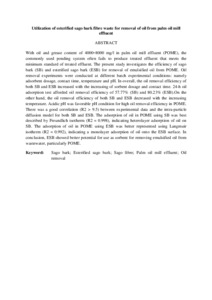Citation
Wahi, Rafeah and Abdullah, Luqman Chuah and Mobarekeh, Mohsen Nourouzi and Ngaini, Zainab and Choong, Thomas Shean Yaw
(2017)
Utilization of esterified sago bark fibre waste for removal of oil from palm oil mill effluent.
Journal of Environmental Chemical Engineering, 5 (1).
pp. 170-177.
ISSN 2213-3437
Abstract
With oil and grease content of 4000–8000 mg/l in palm oil mill effluent (POME), the commonly used ponding system often fails to produce treated effluent that meets the minimum standard of treated effluent. The present study investigates the efficiency of sago bark (SB) and esterified sago bark (ESB) for removal of emulsified oil from POME. Oil removal experiments were conducted at different batch experimental conditions: namely adsorbent dosage, contact time, temperature and pH. In overall, the oil removal efficiency of both SB and ESB increased with the increasing of sorbent dosage and contact time. 24-h oil adsorption test afforded oil removal efficiency of 57.77% (SB) and 80.23% (ESB).On the other hand, the oil removal efficiency of both SB and ESB decreased with the increasing temperature. Acidic pH was favorable pH condition for high oil removal efficiency in POME. There was a good correlation (R2 > 9.5) between experimental data and the intra-particle diffusion model for both SB and ESB. The adsorption of oil in POME using SB was best described by Freundlich isotherm (R2 = 0.998), indicating heterolayer adsorption of oil on SB. The adsorption of oil in POME using ESB was better represented using Langmuir isotherm (R2 = 0.992), indicating a monolayer adsorption of oil onto the ESB surface. In conclusion, ESB showed better potential for use as sorbent for removing emulsified oil from wastewater, particularly POME.
Download File
![[img]](http://psasir.upm.edu.my/63666/1.hassmallThumbnailVersion/Utilization%20of%20esterified%20sago%20bark%20fibre%20waste%20for%20removal%20of%20oil%20from%20palm%20oil%20mill%20effluent.pdf)  Preview |
|
Text (Abstract)
Utilization of esterified sago bark fibre waste for removal of oil from palm oil mill effluent.pdf
Download (105kB)
| Preview
|
|
Additional Metadata
Actions (login required)
 |
View Item |

